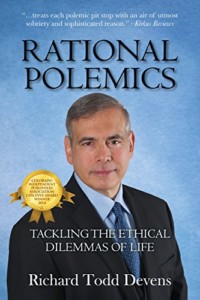Title: Rational Polemics: Tackling the Ethical Dilemmas of Life
Author: Richard Todd Devens
Publisher: Outskirts Press, Inc.
ISBN: 1432798804
Pages: 228
Genre: Philosophy of Ethics & Morality
Interviewed by: Liz Konkel
Author Interview with Richard Todd Devens
Today we are talking to Richard Todd Devens, author of Rational Polemics: Tackling the Ethical Dilemmas of Life.
PBR: You referred to your disillusionment with religion. How did that come about?
As I wrote in my book, since childhood, I always heard the same statements repeated over and over again in regards to religion and God. It has been written that when something, such as a lie, is repeated often enough, it “becomes” true. As I got older, I said to myself, “Hey, wait a minute. This does not make any sense. There are so many contradictions.” Although I totally respect anyone’s religion, and anyone’s right to believe whatever they want to believe (as long as they do not interfere with the rights of others), I had to write about the things that made no sense to me and point out the obvious contradictions.
PBR: The variety of subjects covered in Rational Polemics is very broad. What subjects, if any, have you intentionally stayed away from, and why?
It was my goal to not stay away from any topic that I had strong opinions about. An author should not be afraid to write on any topic, as long as he or she is respectful and the writing is well thought out. I do admit, however, that I did initially hesitate about including the chapter on cannibalism.
PBR: In your book, you are very candid, offering your views without spin. How are your techniques meant to be interpreted – as a “shock jock” inquisitive nature?
When I think of a “shock jock,” I think of someone like Howard Stern. My goal was definitely not to be like a shock jock, or be controversial just for the sake of being controversial. My purpose was to write about topics that were very important to me, to provide food for thought, and to inspire readers to dig deep into themselves to discover answers to dilemmas that made sense to them.
PBR: Over what period of time did you conceive, write, and publish your book? How long prior were you contemplating the project?
My views on religion crystallized as an adult, and this topic was the one I most wanted to write about. I then realized that I had a lot to say on other topics, as well. Some of these topics, I had addressed in unpublished articles when I was a teenager. I looked them over, edited, expanded, and rewrote them as necessary, and then added other topics.
I would say, as there were a couple of breaks, it took me about a year and a half to write the book. When I was going “full blast” with it, it was all-consuming, and there was little time for anything else. Some time before writing the book, the urge to put down in writing the things I had been thinking about for years became stronger and stronger. In my opinion, a writer should not write a book just for the sake of writing a book. He should write a book because he has something important to say, and because he has a burning desire to share his ideas with the world.
PBR: Who are some of your favorite authors, and what books, specifically, have had an influence in your thinking?
I read on a wide variety of topics in different genres, but if I had to pick an author that had the most profound influence on my thinking, I would specify Ayn Rand. As I mentioned in another interview, when I discovered The Virtue of Selfishness many years ago, I felt like I had discovered something I was always looking for, but didn’t know existed. I later read The Fountainhead and Atlas Shrugged, and the latter is the one book I would take with me to a desert island if I could only take one Amongst living authors, I have enjoyed and been greatly influenced by Robert Ringer’s books. He writes in a very non-academic kind of way, and many of his ideas, such as “rational selfishness” have their genesis in Ayn Rand (whose influence one can detect throughout Ringer’s books). When I first saw Looking Out for #1, I read the beginning where he wrote that the purpose of writing the book was to make as much money as possible. That turned me off, and I didn’t buy it. But some time later, I bought it, got past his original declaration, and was hooked.
PBR: What plans do you have for future projects?
As I also mentioned in another interview, I plan to write a book in dialog. A patient is suffering from self-imposed pain and guilt, and sees a therapist of genius…who is not only trained in psychology, but in philosophy. Through the dialog, and by me being able to play devil’s advocate, I can trace how this wise woman is able to guide the patient out of the abyss of his self-imposed Hell.
PBR: Thank you for your time today.
It has been my pleasure.



Follow Us